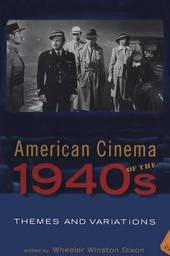
|
American Cinema of the 1940s: Themes and Variations
Paperback / softback
Main Details
| Title |
American Cinema of the 1940s: Themes and Variations
|
| Authors and Contributors |
Edited by Professor Wheeler Winston Dixon
|
| Series | Screen Decades |
|---|
| Physical Properties |
| Format:Paperback / softback | | Pages:272 | | Dimensions(mm): Height 234,Width 156 |
|
| Category/Genre | Film theory and criticism
Individual film directors and film-makers |
|---|
| ISBN/Barcode |
9781845204358
|
| Classifications | Dewey:791.430973 |
|---|
| Audience | | Tertiary Education (US: College) | |
|---|
| Illustrations |
33 b&w illustrations, bibliography, index
|
|
Publishing Details |
| Publisher |
Bloomsbury Publishing PLC
|
| Imprint |
Berg Publishers
|
| Publication Date |
1 February 2006 |
| Publication Country |
United Kingdom
|
Description
The 1940s was a watershed decade for American cinema and the nation. At the start of the decade, Hollywood - shaking off the Depression - launched an unprecedented wave of production, generating some of its most memorable classics, including Citizen Kane, Rebecca, The Lady Eve, Sergeant York, and How Green Was My Valley. Hollywood then joined the national war effort with a vengeance, creating a series of patriotic and escapist films, such as Casablanca, Mrs. Miniver, The Road to Morocco, and Yankee Doodle Dandy. By the end of the war America was a country transformed. The 1940s closed with the threat of the atom bomb and the beginnings of the Hollywood blacklist. Film Noir reflected the new public mood of pessimism and paranoia. Classic films of betrayal and conflict - Kiss of Death, Force of Evil, Caught, and Apology for Murder - depicted a poisonous universe of femme fatales, crooked lawyers, and corrupt politicians.
Author Biography
Wheeler Winston Dixon is the James Ryan Endowed Professor of Film Studies and a professor of English at the University of Nebraska, Lincoln, and, with Gwendolyn Audrey Foster, editor-in-chief of the Quarterly Review of Film and Video.
|